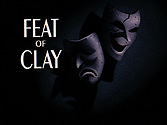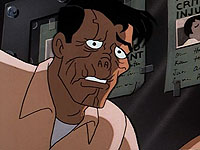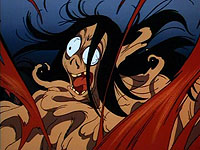|
||
|
| Credits | Cast | |
Story by Marv Wolfman & Michael Reaves Teleplay by Marv Wolfman (I) & Michael Reaves (II) Directed by Dick Sebast (I) & Kevin Altieri (II) Animation by Akom (I) & Tokyo Movie Shinsa (II) Music by Jeff Atmajian & Carl Johnson (I) & Shirley Walker (II) |
Kevin Conroy as Bruce Wayne Efrem Zimbalist Jr. as Alfred Brock Peters as Lucius Fox Ron Perlman as Matt Hagen/Clayface Ed Asner as Roland Daggett |
Mari Devon as Summer Gleeson Ed Begley Jr. as Germs Dick Gautier as Teddy Scott Valentine as Bell |
|
Now, in calling Hagen a one-dimensional character, I do not mean to imply that he and his predicament are uninteresting. After all, other characters in Batman have played symphonies by striking a single note repeatedly—Freeze's haunting monotone comes to mind. Neither is Hagen's motive (revenge) necessarily an uninteresting one—again, witness Freeze. But in a universe of diverse personalities twisted in lurid ways, Hagen's character stands out in its homeliness: He is little more than an overgrown child, a brat fatted on the cynical compliance of others. So where Freeze takes us deep into his grief for a lost wife; where Two-Face makes us meditate on the duality of man; where the Joker plays on the line that separates comedy from chaos, Clayface's rage is merely rage at the loss of—Matt Hagen. Now, to lose oneself would seem to be a tragedy, but to lose oneself when one is Matt Hagen, well, that is an absurdity of existential dimensions. For in Hagen's case there was nothing there to lose. ("An empty taxi cab drove up and Matt Hagen got out," Herman Mankiewicz might have quipped.) Having a personality with a diameter of zero, he was nothing but surface from the start. And therein, I submit, lies the genius of the Clayface character. He is the Player King, resurrected by Beckett and doing a turn as Hamlet, reminding us that the only thing more absurd than pretending to be a person is actually being a person. He is human only on the surface; beneath, there is only embalmer's clay. All that looks deep in him proves shallow, his depth consists in the very fact that he is shallow; beneath the florid surface there is only formless sludge. In pretending to be, he has ceased to actually be; he tried so hard to be other people that he was finally unable to be even himself; the actor has vanished, leaving only the act. There is now no point or purpose to justify his existence, and therein lies his rebuke to us, for what reason have we every morning in rising and preparing a face to meet the faces that we meet?
|
|
Production Notes Bruce Timm on Akom and TMS: Part 1 "was the first episode done by Akom's c-team of animators, and it really bummed us out when it first came in. That show probably had more retakes than any other, nearly completely redone two or three times before we could actually air it without cringing. ... The second part had maybe six retakes on the whole show. ... I think we when we shipped [TMS] 'Clayface,' they said to themselves: 'They think they know everything, but we'll show them how to do this show. We'll change Batman's colors. We'll do special color key treatments on the villains when they're walking over the green vat. We'll blow them away.' ... They did all those colors themselves. We couldn't even ask for those colors if we wanted to. They aren't even in our palette." |
|
Related Episodes |
What Others Are Saying ... |
| Back to Fear of Victory |
Forward to Fire from Olympus |



